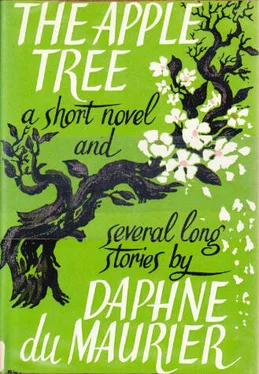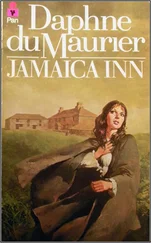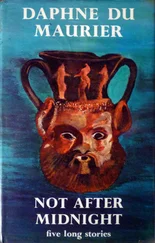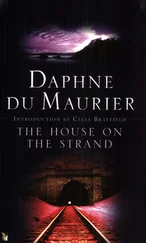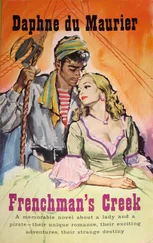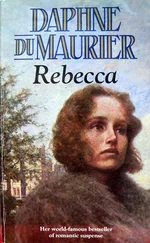Daphne du Maurier - The Apple Tree - a short novel & several long stories
Здесь есть возможность читать онлайн «Daphne du Maurier - The Apple Tree - a short novel & several long stories» весь текст электронной книги совершенно бесплатно (целиком полную версию без сокращений). В некоторых случаях можно слушать аудио, скачать через торрент в формате fb2 и присутствует краткое содержание. Жанр: Современная проза, Триллер, Социально-психологическая фантастика, на английском языке. Описание произведения, (предисловие) а так же отзывы посетителей доступны на портале библиотеки ЛибКат.
- Название:The Apple Tree: a short novel & several long stories
- Автор:
- Жанр:
- Год:неизвестен
- ISBN:нет данных
- Рейтинг книги:5 / 5. Голосов: 1
-
Избранное:Добавить в избранное
- Отзывы:
-
Ваша оценка:
- 100
- 1
- 2
- 3
- 4
- 5
The Apple Tree: a short novel & several long stories: краткое содержание, описание и аннотация
Предлагаем к чтению аннотацию, описание, краткое содержание или предисловие (зависит от того, что написал сам автор книги «The Apple Tree: a short novel & several long stories»). Если вы не нашли необходимую информацию о книге — напишите в комментариях, мы постараемся отыскать её.
The Apple Tree: a short novel & several long stories — читать онлайн бесплатно полную книгу (весь текст) целиком
Ниже представлен текст книги, разбитый по страницам. Система сохранения места последней прочитанной страницы, позволяет с удобством читать онлайн бесплатно книгу «The Apple Tree: a short novel & several long stories», без необходимости каждый раз заново искать на чём Вы остановились. Поставьте закладку, и сможете в любой момент перейти на страницу, на которой закончили чтение.
Интервал:
Закладка:
She began to feel sleepy. The sun beat down upon her uncovered head, and the dragon-flies, gaudy and green and gold, swung and hovered before her eyes. She yawned and leant back against the bracken.
"Would you care for my coat as a pillow for your head, Madame la Marquise?" he asked her.
Before she could reply he had taken his coat, folded it neatly, and placed it in a little roll against the bracken. She leant back against it, and the despised grey coat made a softness to her head, easy and comfortable.
He knelt beside her, intent upon his camera, doing something to the film, and she watched him, yawning, between half-closed eyes, and noticed that as he knelt he kept his weight upon one knee only, thrusting the deformed foot in the high boot to one side. Idly, she wondered if it hurt to lean upon it. The boot was highly polished, much brighter than the leather shoe upon the left foot, and she had a sudden vision of him taking great pains with the boot every morning when he dressed, polishing it, rubbing it, perhaps, with a wash—leather cloth.
A dragon-fly settled on her hand. It crouched, waiting, a sheen upon its wings. What was it waiting for? She blew upon it and it flew away. Then it came back again, hovering, insistent.
Monsieur Paul had put aside his camera but he was still kneeling in the bracken beside her. She was aware of him, watching her, and she thought to herself, "Ii' I move he will get up, and it will all be over."
She went on staring at the glittering, shivering dragon-fly, but she knew that in a moment or two she must look somewhere else, or the dragon-fly would go, or the present silence would become so tense and so strained that she would break it with a laugh and so spoil everything. Reluctantly, against her will, she turned to the photographer, and his large eyes, humble and devoted, were fixed upon her with all the deep abasement of a slave.
"Why don't you kiss me?" she said, and her own words startled her, shocked her into sudden apprehension.
He said nothing. He did not move. He went on gazing at her. She closed her eyes, and the dragon-fly went from her hand.
Presently, when the photographer bent to touch her, it was not what she expected. There was no sudden crude embrace.
It was just as though the dragon-fly had returned, and now with silken wings brushed and stroked the smooth surface of her skin.
When he went away it was with tact and delicacy. He left her to herself so that there should be no aftermath of awkwardness, of embarrassment, no sudden strain of conversation.
The Marquise lay back in the bracken, her hands over her eyes, thinking about what had happened to her, and she had no sense of shame. She was clear-headed and quite calm. She began to plan how she would walk back to the hotel in a little while, giving him good time to gain the sands before her, so that if by chance people from the hotel should see him they would not connect him with her, who would follow after, say in half-an-hour.
She got up, rearranged her dress, took out her powder compact from her pocket, with her lip-stick, and, having no mirror, judged carefully how much powder to put upon her face. The sun had lost its power, and a cool breeze blew inland from the sea.
"If the weather holds," thought the Marquise as she combed her hair, "I can come out here every day, at the same time. No one will ever know. Miss Clay and the children always rest in the afternoon. If we walk separately and go back separately, as we have done today, and come to this same place, hidden by the bracken, we cannot possibly be discovered. There are over three weeks still to the holiday. The great thing is to pray for this hot weather to continue: If it should rain…"
As she walked back to the hotel she wondered how they would manage, should the weather break. She could not very well set out to walk the cliffs in a mackintosh, and then lie down while the rain and the wind beat the bracken. There was of course the cellar, beneath the shop. But she might be seen in the village. That would be dangerous. No, unless it rained in torrents the cliff was safest.
That evening she sat down and wrote a letter to her friend Elise."…. This is a wonderful place," she wrote, "and I am amusing myself as usual, and without my husband, bien entendu!" But she gave no details of her conquest, though she mentioned the bracken and the hot afternoon. She felt that if she left it vague Elise would picture to herself some rich American, travelling for pleasure, alone, without his wife.
The next morning, dressing herself with great care — shestood for a long while before her wardrobe, finally choosing a frock rather more elaborate than was usual for the sea-side, but this was deliberate on her part — she went down into the little town, accompanied by Miss Clay and the children. It was market-day, and the cobbled streets and the square were full of people. Many came from the countryside around, but there were quantities of visitors, English and American, who strolled to see the sights, to buy souvenirs and picture-postcards, or to sit down at the café at the corner and look about them.
The Marquise made a striking figure, walking in her indolent way in her lovely dress, hatless, carrying a sunshade, with the two little girls prancing beside her. Many people turned to look at her, or even stepped aside to let her pass, in unconscious homage to her beauty. She dawdled in the market-place and made a few purchases, which Miss Clay put into the shopping-bag she carried, and then, still casual, still answering with gay, lazy humour the questions of the children, she turned into the shop which displayed Kodaks and photographs in the window.
It was full of visitors waiting their turn to be served, and the Marquise, who was in no hurry, pretended to examine a book of local views, while at the same time she could see what was happening in the shop. They were both there, Monsieur Pau and his sister, he in his stiff shirt, an ugly pink this time, worse even than the blue, and the cheap grey coat, while the sister, like all women who served behind a counter, was in drab black, a shawl over her shoulders.
He must have seen her come into the shop, because almost at once he came forward from the counter, leaving the queue of visitors to the care of his sister, and was by her side, humble, polite, anxious to know in what manner he could serve her. There was no trace of familiarity, no look of knowledge in his eyes, and she took care to assure herself of this by staring directly at him. Then deliberately, bringing the children and Miss Clay into the conversation, asking Miss Clay to make her choice of the proofs which were to be sent to England, she kept him there by her side, treating him with condescension, with a sort of hauteur, even finding fault with certain of the proofs, which, so she told him, did not do the children justice, and which she could not possibly send to her husband, the Marquis. The photographer apologised. Most certainly the proofs mentioned did not do the children justice. He would be willing to come again to the hotel and try again, at no extra charge, of course. Perhaps on the terrace or in the gardens the effect would be better.
One or two people turned to look at the Marquise as she stood there. She could feel their eyes upon her, absorbing her beauty, and still in a tone of condescension, coldly, almost curtly, she told the photographer to show her various articles in his shop, which he hastened to do in his anxiety to please.
The other visitors were becoming restive, they shuffled their feet waiting for the sister to serve them, and she, hemmed about with customers, limped wretchedly from one end of the counter to the other, now and again raising her head, peering to see if her brother, who had so suddenly deserted her, would come to the rescue.
Читать дальшеИнтервал:
Закладка:
Похожие книги на «The Apple Tree: a short novel & several long stories»
Представляем Вашему вниманию похожие книги на «The Apple Tree: a short novel & several long stories» списком для выбора. Мы отобрали схожую по названию и смыслу литературу в надежде предоставить читателям больше вариантов отыскать новые, интересные, ещё непрочитанные произведения.
Обсуждение, отзывы о книге «The Apple Tree: a short novel & several long stories» и просто собственные мнения читателей. Оставьте ваши комментарии, напишите, что Вы думаете о произведении, его смысле или главных героях. Укажите что конкретно понравилось, а что нет, и почему Вы так считаете.
